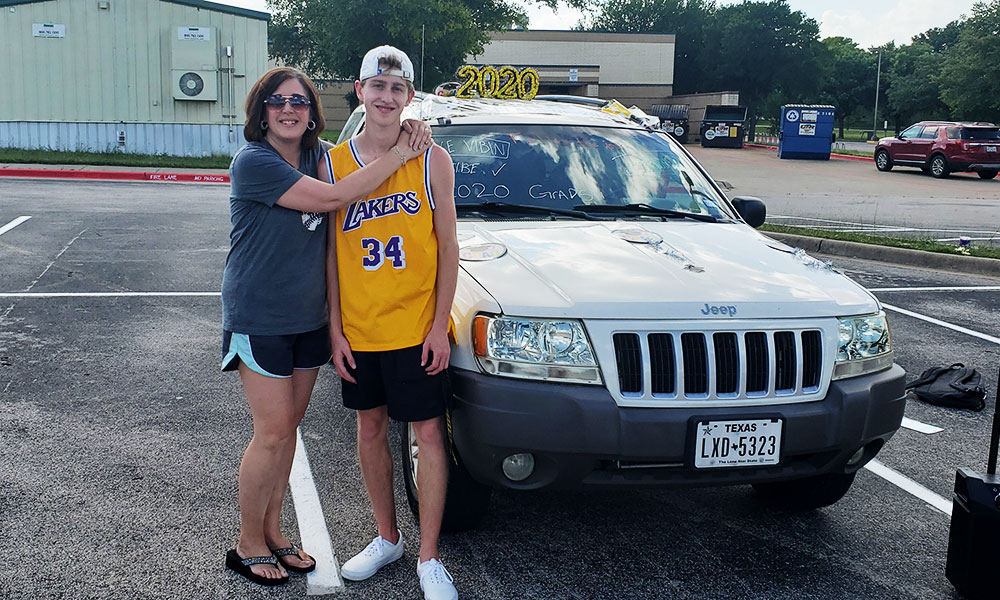Despite Pandemic, Texans Get the Job Done

Whether organizing a large neighborhood event, running a nonprofit or helping children become volunteers, Texans get the job done, despite a pandemic. Across the state, citizens are adapting to the “new normal.”
Pandemic-Proof Graduation Celebration
Julie Beaubien and her family, with two young sons, moved from the Detroit area to Round Rock in the summer of 2007.
“They talk about bringing a lot of Motor City pride, but they’ve grown up to be proud Texans!” Beaubien happily reminisces.
Oldest son Paul joined fellow high school seniors across the state who patiently waited to hear whether they would have a graduation ceremony after the COVID-19 pandemic hit.
“I was a bit frustrated in not hearing a lot of news about plans to honor seniors — everything was cancelled,” says Beaubien. “My youngest son, Tommy, is in eighth grade and also experienced his own loss in not attending his middle school graduation ceremony, band activities and trip, etc. With two graduates in my home, I couldn’t stand by.
“I’ve always told my kids that it’s easy to complain, but it’s hard work enacting powerful and meaningful change,” Beaubien says. “That’s where you need to focus your efforts.”
Via Facebook, Beaubien asked her neighbors and area seniors to pick from a few ideas, and was overwhelmed by the positive feedback. The majority voted for a parade.
More than 100 seniors turned out in their caps and gowns and paraded down the streets as their neighbors cheered. It was exactly what Beaubien was hoping for: “… not just creating a positive memory for my son Paul, but for all the other graduates in our neighborhood.”
Austin Diaper Bank: Getting Behind a Good Cause
“Our diaper donations have dropped significantly due to the stay-at-home orders and COVID-19,” says Holly McDaniel, executive director of outreach for the Austin Diaper Bank.
The bank serves 35 partner agencies in Central Texas, including food pantries, shelters and home visit programs. Since mid-March, diaper donations have decreased – but McDaniel has seen an almost 200 percent increase in families who need help with diapers.
“Normally we distribute 70,000 diapers each month, and now we are distributing 200,000 diapers each month,” says McDaniel.
Although the Austin Diaper Bank temporarily stopped taking diaper donations due to safety precautions, it continued to receive community help through monetary donations, which kept them going.
“We now rely on financial donations to purchase diapers in bulk directly from manufacturers — 50,000 to 70,000 diapers at a time,” says McDaniel.
The organization has received substantial financial assistance from the ATX All Together Fund and the Moody Foundation, as well as community members during the pandemic.
“We are thankful for the generous support,” says McDaniel, “which will help us serve families in Central Texas for the coming months.”
Generation SERVE: Virtual Volunteerism
Generation SERVE volunteers are also making an impact in Central Texas. This nonprofit’s mission is to engage children in volunteerism and empower them to make a difference in their communities. Last year, the organization collaborated with 93 different nonprofit partners and coordinated the activities of more than 1,900 youth volunteers.
But when stay-at-home orders were enacted, Generation SERVE had to pivot.
“For most people, part of the appeal of Generation SERVE is volunteering in a social setting with others, and that just isn’t possible right now,” says Beth Foulds, program manager for Generation SERVE. “Additionally, most of our volunteering is done in conjunction with our community partners, who are also trying to figure out how volunteers can help while keeping everyone safe. Although many partners need support now more than ever, it is not always easy to figure out how to help without endangering anyone.”
As a result, Generation SERVE successfully switched to virtual volunteering opportunities, done entirely at home with supplies on hand and that are open to anyone.
“We have a weekly theme and post something each day related to that topic,” Foulds explains. “For example, we have a video introduction on Monday and a story time on Wednesday that are linked to our Friday volunteer activity.
“Youth are still able to volunteer and impact their community — it just looks a little different,” she says.
Foulds says participants have given them high marks and appreciate how the organization has pivoted during these challenging circumstances. She anticipates some volunteers will continue to help virtually after social distancing has lifted.

